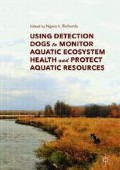Abstract
Unsustainable harvest and illegal trade of wild flora and fauna threatens many aquatic species and ecosystems. Detector dogs can be used to quickly and discreetly screen checked or handheld luggage, freight, or passengers. Here, the steps leading to the implementation of relevant detection dog capacity at the Frankfurt Airport in Germany is briefly detailed, with observations about current enforcement, inspections, and information-sharing networks in relation to known smuggling and trade routes, and to priority targets. Three case studies are also presented: from Canada, the United States, and India, to convey the extent to which dogs are being used to protect aquatic species and resources in relation to other ongoing efforts and targets. Constraints or limitations to their use for aquatic applications are also considered.
Access this chapter
Tax calculation will be finalised at checkout
Purchases are for personal use only
Notes
- 1.
TRAFFIC is a non-governmental wildlife trade monitoring network with offices and field teams around the world. For more information, see: http://www.traffic.org/overview/
- 2.
Staff from the zoo attended the trial and took care of the animals, which were selected on the basis of being more ‘stress resistant’. After the trial, all the reptiles and the toad were returned to the zoo, safe and well.
- 3.
The Convention on International Trade in Endangered Species of Wild Fauna and Flora, a multilateral treaty/agreement to protect endangered animals and plants.
- 4.
R. Thomas, Global Communications Coordinator, TRAFFIC (Cambridge UK Office), pers. comm., 2017.
- 5.
Refers broadly to a group of marine gastropod mussels (which have a beautifully colored inner shell) that are eaten as a delicacy.
- 6.
- 7.
Other groups and entities, such as the Sea Shepherd Conservation Society Galapagos, a nongovernmental organization (NGO), also have dogs trained to detect illegally harvested sea cucumbers. In the case of this NGO, sea cucumbers and shark fin comprise the two primary targets to which the dogs are trained (http://www.seashepherd.org/galapagos/).
- 8.
- 9.
Petfinder is a nonprofit internet company which facilitates an online pet adoption website across North America.
- 10.
Retired Lieutenant Lynette Shimek is a California Department of Fish & Wildlife (CDFW) K9 trainer. See also Chap. 4 regarding her involvement in the development of dreissenid mussel inspection dog-handler teams.
- 11.
The Washington Animal Trafficking Act ‘… makes it illegal to traffic in animal parts or products from certain international endangered animals. The law makes it a crime to buy, sell, trade, or otherwise distribute these items’ (http://wdfw.wa.gov/help/questions/429/What+is+the+Washington+Animal+Trafficking+Act%3F).
- 12.
Around $800 USD.
- 13.
Dr. Susan Waddy, a DFO Research Scientist, now retired.
- 14.
TRAFFIC is a wildlife trade monitoring network and a strategic alliance of WWF and the IUCN. In India, TRAFFIC’s country office operates as a program division of WWF-India. For more information, see: http://www.traffic.org/overview/; www.trafficindia.org
- 15.
For detailed insight into the training, please visit this article ‘From a puppy to a Super Sniffer’: https://www.wwfindia.org/about_wwf/enablers/traffic/our_work/training_sniffer_dogs/puppy_to_a_super_sniffer/
References
Braun, B. (2013). Wildlife detector dogs – A guideline on the training of dogs to detect wildlife in trade. WWF Germany. Available at http://www.traffic.org/non-traffic-papers/. Accessed 7 Jan 2018.
Braun, B., & De Rosa, C. (2012, April 24–26). Proceedings of the conference on wildlife detector dogs. Budapest, Hungary. WWF Germany. Available at http://www.traffic.org/proceedings/. Accessed 7 Jan 2018.
Felgentreu, B. (Ed.) (2006, March 3–5). Proceedings of the international expert workshop on wildlife detector dogs. Bad Schandau, Germany. WWF Germany and TRAFFIC Europe, Frankfurt am Main. Available at http://www.traffic.org/proceedings/. Accessed 7 Jan 2018.
Hance, J. (2016). China’s craze for ‘aquatic cocaine’ is pushing two species into oblivion. The Guardian, [online]. Available at https://www.theguardian.com/environment/radical-conservation/2016/jan/11/china-aquatic-cocaine-vaquita-totoaba-mexico-endangered-extinct. Accessed 7 Jan 2018.
Parry-Jones, R. (1998). The feasibility of using canines to detect wildlife contraband. TRAFFIC East Asia, Hong Kong. Available at http://www.traffic.org/enforcement-reports/traffic_pub_enforce8.pdf. Accessed 5 Jan 2018.
Sea Shepherd. (2015). New recruits’ join Sea Shepherd’s K-9 unit in The Galapagos. [online] Available at http://www.seashepherd.org/news-and-commentary/news/new-recruits-join-sea-shepherd-s-k-9-unit-in-the-galapagos.html. Accessed 5 Jan 2018.
The Lobster Institute, The University of Maine. Life of the American lobster – Life cycle & reproduction. [online]. Available at http://umaine.edu/lobsterinstitute/education/life-of-the-american-lobster/life-cycle-reproduction/. Accessed 5 Jan 2018.
TRAFFIC. Wildlife sniffer dog helps apprehend poacher just a week after deployment. [online]. Available at http://www.traffic.org/home/2018/1/4/wildlife-sniffer-dog-helps-apprehend-poacher-just-a-week-aft.html. Accessed 4 Jan 2018.
Washington Department of Fish & Wildlife. Aquatic invasive species [online]. Available at: http://wdfw.wa.gov/ais/fish.html. Accessed 7 Jan 2018.
Washington State Legislature. RCW 77.15.135 unlawful sale, purchase, trade, barter, or distribution of covered animal species part or product—Penalty—Report to the legislature—Adoption of rules (i.e., The Washington Animal Trafficking Act). [online]. Available at http://app.leg.wa.gov/rcw/default.aspx?cite=77.15.135. Accessed 4 Jan 2018.
World Wildlife Fund India. From a puppy to a Super Sniffer – Read to know about their journey. [online] Available at https://www.wwfindia.org/about_wwf/enablers/traffic/our_work/training_sniffer_dogs/puppy_to_a_super_sniffer/. Accessed 5 Jan 2018.
Acknowledgments
Birgit Braun extends special thanks to her husband Matthias-Alexander Braun, for his ongoing support and understanding regarding her work. Earlier versions of this chapter were much improved by input from Dr. Richard Thomas, Global Communications Coordinator at TRAFFIC (Cambridge, UK Office). Thanks are also extended to Lieutenant José Antonio Alfaro, formerly with the Environmental Police Branch of SEPRONA/Guardia Civil in Andalucía, Spain, now embedded with EUROPOL in The Hague (Netherlands) for his feedback.
Author information
Authors and Affiliations
Corresponding author
Editor information
Editors and Affiliations
Section Editor information
Rights and permissions
Copyright information
© 2018 The Author(s)
About this chapter
Cite this chapter
Braun, B., Stuart, J. (2018). A Glimpse into the Use of Dogs to Address Global Poaching, Overharvesting, and Trafficking of Aquatic Species. In: Richards, N. (eds) Using Detection Dogs to Monitor Aquatic Ecosystem Health and Protect Aquatic Resources. Palgrave Macmillan, Cham. https://doi.org/10.1007/978-3-319-77356-8_7
Download citation
DOI: https://doi.org/10.1007/978-3-319-77356-8_7
Published:
Publisher Name: Palgrave Macmillan, Cham
Print ISBN: 978-3-319-77355-1
Online ISBN: 978-3-319-77356-8
eBook Packages: Social SciencesSocial Sciences (R0)

